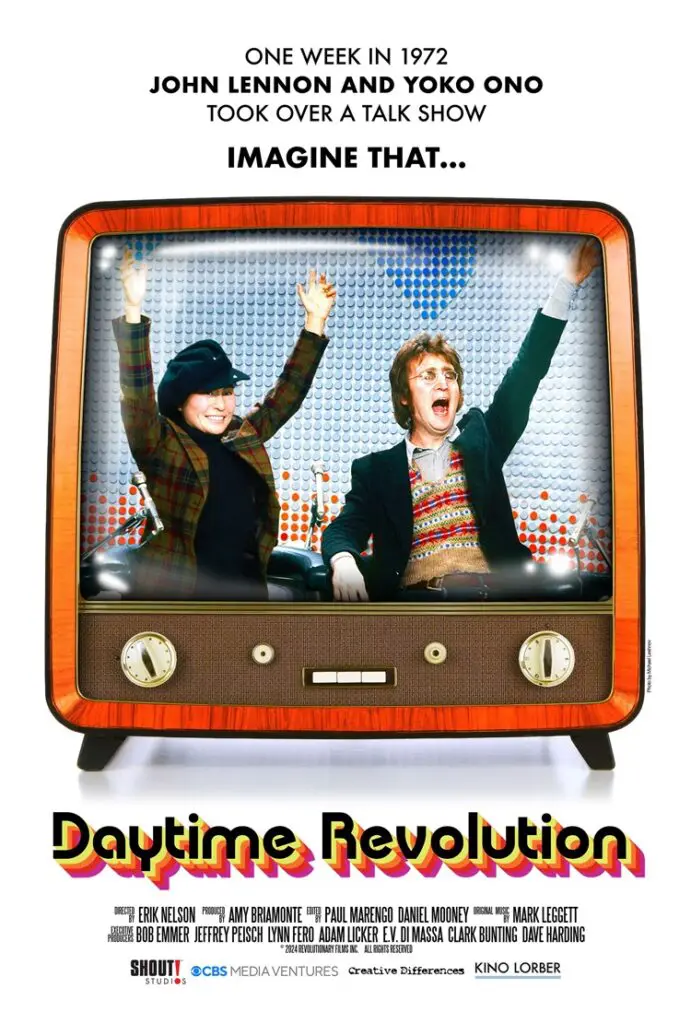
The date was February 14, 1972, and unsuspecting stay-at-home mothers sat down to watch an episode of the Mike Douglas Show. After a pleasant rendition of “Michelle,” the affable host welcomed his guest co-hosts for the week: John Lennon and Yoko Ono. When he asked the couple what they wanted to discuss during their five-day stint, Lennon responded in a way that must have shocked home viewers:
“Love, peace, communication, women’s lib, prisons…life in general,” he said.
Thus began an unforgettable week of television, one chronicled in Daytime Revolution, a documentary revisiting a unique meeting of the mainstream with the counterculture. Director Erik Nelson interviews several guests from the five episodes, including Ralph Nader, macrobiotic chef Hilary Redleaf, performer/singer Vivian Reed, avant-garde musician David Rosenbloom, and biofeedback researcher Gary Schwartz, among many others. Along with pristinely restored clips, the film provides a look back at a volatile political period and how one show—along with two famous figures—brought it all into people’s living rooms.
Buy Mike Douglas – Moments & Memories DVDBy 1972, Lennon and Ono had settled in New York’s East Village and became involved in radical politics, participating in protests and befriending political activists such as Jerry Rubin. Interested in bringing their message of peace and love to Middle America, they approached an unlikely ally: Douglas, who at the time hosted one of the most popular daytime shows in the country. One of the film’s more fascinating interview subjects, Mike Douglas Show Associate Producer E. V. Di Massa, describes how Douglas grew to admire the couple, particularly Lennon, as the week of episodes wore on.
Douglas proved to be fairly open-minded as avant-garde and activist musicians, radical politicians, and other counterculture figures (all suggested by Lennon and Ono) comprised the week’s guests. Lennon proved to be an astute interviewer, with Schwartz stating in particular that he felt as though he was speaking to a peer as much as a musician.
Not surprisingly, some musical segments are included, including when Chuck Berry performed “Memphis, Tennessee” with Lennon, Ono, and Elephant’s Memory (unfortunately, the second song they played, “Johnny B. Goode,” is not included here). Watching Lennon beaming at Berry during the performance and interview demonstrates his worship of the rock pioneer; amazingly, that exchange marked their first meeting. Rosenbloom recalls eavesdropping backstage when Lennon and Berry first met, stating the moment was “powerful.” Lennon also turns in vibrant versions of “Imagine” and “It’s So Hard,” treasures since few live solo performances exist.
Ono also receives attention in the film, with a powerful performance of “Sisters O Sisters” and demonstrations of art projects encouraging audience participation (classic examples of the Fluxus art movement). One segment the documentary curiously omits is when Lennon, Ono, and Douglas call random people to tell them they love them; perhaps the cringeworthy results haven’t aged very well.
Di Massa’s recollections while watching the shows—noting the interactions between Douglas and Lennon—prove to be fascinating, particularly when explaining how surprisingly comfortable the main host was interviewing Black Panther Bobby Seale. Rubin proved to be the most unnerving guest, with Douglas and even Lennon on edge, afraid he may appear unhinged.
Intercutting news clips from the time places the Mike Douglas shows in context, demonstrating just how much Lennon and Ono’s guests addressed controversial topics. In fact, as Daytime Revolution notes, the Nixon administration would increase surveillance on Lennon after these episodes aired.
An implicit question the film asks: could this show be aired in today’s political environment? Hard to say, but Daytime Revolution represents a moment when multi-generations united to discuss current issues in an often playful way, and daytime television was never the same. John Lennon fans and history fans alike will find much to enjoy in this fascinating film.